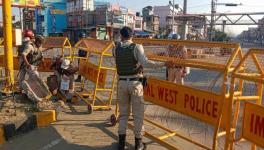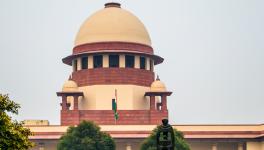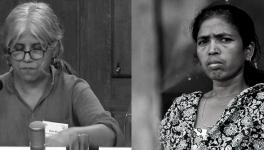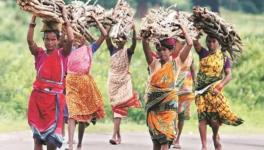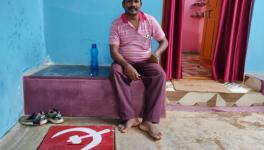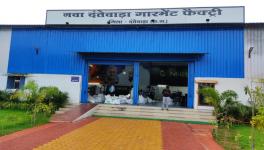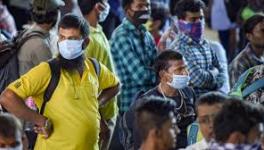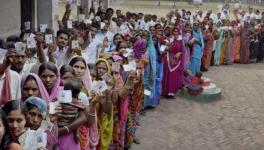When Politics Gets Turned on its Head
By giving poll boycott calls and indulging in violence to instill fear among voters, the Maoists are shrinking the very space that offers everyone, including them, to articulate contending perspectives.

Image for representational use only. Image Courtesy: Rediff.com
In less than a fortnight, the cadres of CPI(Maoist) have carried out a series of attacks in order to disrupt the election and make their presence felt in what is considered their bastion. If one were to compare October-November 2013 with corresponding figure for 2018, it shows that whereas in October-November 2013 there were 76 incidents of violence, in this year’s Assembly polls, there was a step up in such incidents to 105. Even in terms of killings attributed to Assembly elections, 17 people were killed in 2013 compared with 20 this year.
It is reported that the size of armed Maoist cadres, 1,500 out of a total of 6,500 cadres, (Mint, November 12, 2018) pales in front of 25,000 state police and 50,000 central para military forces. Indeed, with deployment of 77,000 additional security personnel for elections even less so. However, it is the rise in the number of incidents that suggests that Maoists cadres have stepped up their violent opposition to elections.
November 11: BSF sub-inspector Mahendra Singh killed in an IED blast in Koylibeda block of Kanker district.
November 8: Four civilians and one CISF head constable were killed when an IED (improvised explosive device) exploded in a bus hired by Central Industrial Security Force (CISF) for their use during the election, near Bacheli in Dantewada. Two other CISF personnel were grievously injured.
November 7: A former sarpanch and a local member of CPI Dhurva Kalmu, out on election campaign, was killed in Bodko village under PS Phoolanbagdi, Dantewada.
November 6: A bus carrying passengers on its way between Jagdalpur and Usoor was intercepted. The 35 passengers were asked to get off and the bus was set on fire.
November 4: Two persons, Aaytu Hemla and Sonu Penam, were abducted near Baddepara village, under P.S. Gangaloor. Aaytu Hemla was beaten to death while Sonu Penam was released.
October 30: Doordarshan cameraperson Achyutananda Sahu and sub-inspector Rudra Pratap, Constable Manglu and Assistant Constable Rakesh Gautam died in an ambush in Aranpur sector of Dantewada district in Chhattisgarh.
Deeptiman Tiwary writing in the Indian Express (November 11, 2018) quoted a senior security officer who pointed out that unlike earlier where Maoists would launch attacks with 100-200 armed cadres, they now carry out more localised attacks with smaller groups numbering 15-20. This gives these smaller groups autonomy to carry out, on their own, attacks. And perhaps as a consequence there is a perceptible rise in election violence.
Be that as it may, what is more important for us is to ask as to why a movement which has suffered egregiously due to relentless pressure of government forces compounded by their own political failings, seeks to strike fear among Adivasi villagers to ensure that they do not vote. So instead of being an appeal or exhortation for boycott of elections, it is held out as a threat and a warning to villagers to not exercise their mandate.
It needs reiteration that to campaign for boycott of elections is a legitimate political pursuit just as canvassing for vote is. But to replace politics of persuasion by forcibly preventing people from casting their mandate is not just a grievous error but becomes a criminal act. In no way can this contribute to making their political perspective acceptable to the mass of people. That Maoists cadres are doing this, at a moment when they are reeling under government offensive, is akin to cutting the very branch on which one sits.
The point which concerns me most is the fact that a political formation which claims to fight for the downtrodden and the weak, does not hesitate to target them in order to deter others from coming out to vote. If Maoists are unable to convince people about their politics, then this reflects poorly on their political appeal. When a party stoops to threaten or instills fear in order to fulfill its policy, then it is time to take another look at the kind of politics that sees people as malleable and/or expendable.
For decades, the Adivasis of Bastar have been fighting the State over issues of forest land acquisition for mining, systematic dilution of constitutional and legal protection, filing of false cases, their prolonged incarceration in jails, contamination of rivers and displacement from their abode. The democratic space to raise these issues has already been heavily criminalised by the State, as we witnessed over the past few years when journalists, lawyers, social activists and civil liberty groups were hounded and most of them forced to leave Bastar.
Indeed, anyone questioning the government’s mining and industrialisation of the areas where Adivasis reside is/was accused of being “anti-national” and “anti development”, never mind how this ‘development’ enriched the rich and systematically marginalised the local communities. In such a situation, what the Maoists have ensured through their IED explosion, ambush and killings is the use of coercion to get their view accepted. This approach, which can ride roughshod over people’s own choice, also helps sideline the most important issues which concern the Adivasis; disappearance and destruction of forests land and loss of their source of livelihood.
The corporate media, ever willing to sideline the main concerns of people, has found in these acts something sensational and has with ease managed to suppress the debate and discussion around the most vital concerns of the Adivasis, in whose name Maoists claim to be waging their “People’s War’.
While elections may not have resulted in providing the Indian people with a ruling party which will speak up for the oppressed and the exploited, amoral politicians reduce election campaign promises to jumlas (i.e poll promises not to be taken seriously). The wretched conditions in which the overwhelming majority of Indian people live and the excruciatingly slow pace of improvement in their lives testifies to that. But, for all these faults, elections paradoxically also offer space for raising vital issues of people’s concern. An opportunity to propagate people’s concerns and raise demands. This is also a period when there is a desire and willingness to listen to a variety of perspectives. In other words, Maoists had an opportunity to propagate their views which they botched up by their blood-letting. In the process, Maoists also helped in shrinking the very space that offers everyone, including them, to articulate contending perspectives.
This brings me to the last point. CPI(Maoist) has had a chequered history with election boycott campaigns. Sometimes they preach election boycott while they openly ask the electorate to “vote out party A or B”. This happened in undivided Andhra Pradesh as well as in West Bengal. In other words, even when they claimed to champion poll boycott, they ask people to vote out a party and thus implicitly back another party.
Even in Bastar, while some of their posters, reportedly, ask people to ensure the defeat of Bharatiya Janata Party, there are other posters which warn people against voting. So what is their approach to elections? No one is sure anymore. What all this means is that they actually do not have a principled position on elections and are as opportunistic as they accuse their opponents of being. Verily, politics devoid of respect for people and their concern will reveal itself in how one carries out the campaign. Its absence is made visible in the bloody confrontation during elections.
In this context, the acts of the CPI (Maoist) provide further impetus to the State to inflict harm through use of criminal laws and military means against dissidents. Consequently, CPI(Maoist) faced with a quagmire, bring about their own undoing through such senseless acts. Ironically, learning from one’s mistakes and not repeating reckless acts for which they paid a heavy price in the past, is said to be the their creed. Repeating the same mistake in the name of election boycott, as in the past, suggests they do not practice what they preach.
Get the latest reports & analysis with people's perspective on Protests, movements & deep analytical videos, discussions of the current affairs in your Telegram app. Subscribe to NewsClick's Telegram channel & get Real-Time updates on stories, as they get published on our website.









